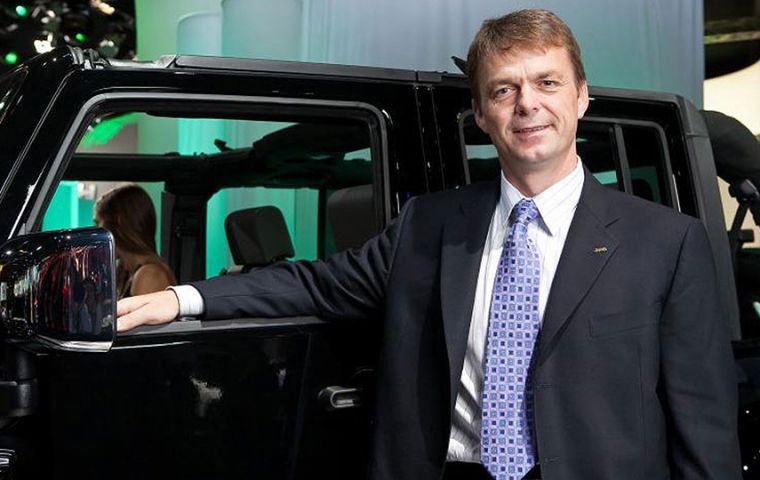MercoPress. South Atlantic News Agency
Fiat-Chrysler partnership with Renault / Nissan more than just rumours
 “We are going into an environment where there are going to be opportunities,” Fiat-Chrysler CEO Mike Manley said.
“We are going into an environment where there are going to be opportunities,” Fiat-Chrysler CEO Mike Manley said. A merger between automotive giants Renault and Fiat-Chrysler could be announced any minute since talks are gaining momentum, sources within the industry hinted Sunday.
In Paris, a Renault board meeting is scheduled for 8:00 am (0600 GMT) Monday. Renault’s current major partnership is with Japan’s Nissan, in which it holds 43 percent. Nissan in turn owns 15 percent of its French partner Renault but the imbalance in the relationship has led to frictions, highlighted by the arrest of former Renault and Nissan chief Carlos Ghosn in Tokyo.
The CEOs of both automakers have made it clear they are open to partnerships that would allow them to further cut costs both in terms of manufacturing as well as in developing vehicles. The move could be especially beneficial in Europe where auto sales overall are under pressure. Working together could also allow both companies to close plants.
During Fiat Chrysler's most recent earnings call, CEO Mike Manley was asked about the possibility of merging with another automaker. “We have made it clear in the past that we want to be active and proactive to develop our business and improve the value for our shareholders,” Manley said. “We are going into an environment where there are going to be opportunities,” he added in what represented a change of mind from his views back in January, when he said he was confident Fiat Chrysler no longer needed a merger or an alliance, which his predecessor had actively sought.
Both The Financial Times and The Wall Street Journal have reported recentlly about a possible deal which could include Renault and Fiat Chrysler “joining large portions of their businesses,” while a more cautious New York Times said discussions were yet in their early stages, and “could still collapse.”
The Financial Times, quoting multiple people informed on the talks, said: “The agreement may ultimately lead the carmaker (Fiat-Chrysler) to join the Renault-Nissan-Mitsubishi Alliance in the future,” if Japanese auto major Nissan could be won over. Early this year, rumours circulated that Renault was interested in Fiat-Chrysler after its hopes for a full merger with Nissan or even French competitor PSA were dashed. Such an alliance would become the world’s biggest, a title Renault-Nissan-Mitsubishi currently vies for with Germany’s Volkswagen.
Following his arrest, Ghosn was bailed for a second time on April 25 and is now preparing for trial on four charges of financial misconduct ranging from concealing part of his salary, to using Nissan funds for personal expenses.
Under Ghosn, Renault was increasingly interested in a full merger with Nissan, its partner in an alliance that has delivered mixed results. When the two automakers first formed their alliance in the late 1990s, the combination helped Nissan cut losses and ultimately become a highly profitable automaker. Other analysts say today Renault needs Nissan, the dominant performer in the alliance, to continue contributing to Renault financially as the French automaker’s performance slips in Europe.
A partnership between Fiat Chrysler and Renault would also help the automakers pool resources for the development of electric and autonomous vehicles. Renault's EV program is considered to be more advanced than Fiat Chrysler's, but neither company is considered a leader in electric vehicles.
Ford Motor and Volkswagen recently agreed to work together in pickup trucks and commercial vans and are in talks about combining their efforts to develop self-driving cars.
In Europe, Fiat Chrysler and Renault face tighter environmental regulations that are forcing carmakers to invest billions in electric vehicles and other new technologies that cut tailpipe emissions. Both are also struggling to gain ground in China, the world’s largest auto market, and have been slower than some rivals in developing autonomous vehicles.
An alliance with Fiat Chrysler would give Renault access to the US market, where it currently has no presence.
By 2015, Fiat-Chrysler's then boss Sergio Marchionne publicly proposed combining with General Motors and the company also explored the possibility of linking up with Chinese firms. But since then, rising sales of pickup trucks and Jeeps have bolstered its coffers. In recent months, vehicle sales have slowed, and Fiat Chrysler’s net profit fell 47 percent in the first quarter to 508 million euros.
Renault’s new chairman, Jean-Dominique Senard, this month proposed merging the French carmaker with Nissan under a holding-company framework, citing fierce industry competition for electric vehicles and emerging technologies, as well as headwinds in the companies’ main markets.
The proposal, which was floated to Nissan behind closed doors but leaked to the Japanese media, was roundly rebuffed by Nissan’s chief executive, Hiroto Saikawa, who has long opposed the idea. He has sought to reshape the alliance’s balance of power, in which Renault owns a 43 percent stake in Nissan, while Nissan holds a 15 percent share in Renault that does not carry voting rights — a move that Renault, in turn, has opposed.
But pressure for a tie-up has intensified as Nissan’s performance flags. Nissan this month reported a 45 percent slump in operating profit in the last fiscal year, and warned of a near 30 percent drop this year. Renault officials have said they are highly concerned about Nissan’s performance, and see a merger as an essential step toward strengthening the alliance.




Top Comments
Disclaimer & comment rulesCommenting for this story is now closed.
If you have a Facebook account, become a fan and comment on our Facebook Page!